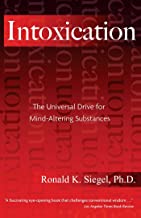Intoxication, Substance Induced
Resources for Patients and Caregivers
Intoxication. Intoxication refers to development of a reversible substance-specific syndrome of mental and behavioral changes that may involve altered perception, euphoria, cognitive impairment, impaired judgment, impaired physical and social functioning, mood lability, belligerence, or a combination.
Cluster Number:
Wiki Number: 25-Intoxication, Substance Abuse
Diagnosis:
US Patients:
World Patients:
Sex Ratio:
Age Onset:
Brain Area:
Symptoms:
Progression:
Causes:
Medications:
Therapies:
Youtube Video: Substance Abuse, Intoxication & Withdrawal . . .
Amazon or Library Book: Intoxication,
The Universal Drive for Mind-Altering Substances
Click the book to link or order from Amazon.

